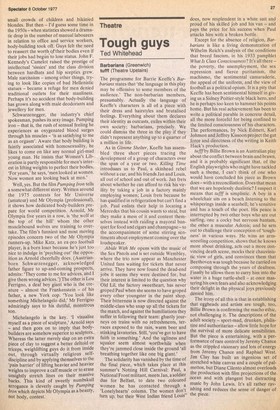Theatre
Tough guys
Ted Whitehead
Barbarians (Greenwich) tufff (Theatre Upatairs) The programme for Barrie Keeffe's Barbarians states that 'the language in this play may be offensive to some members of the audience.' The non-barbarian members, presumably. Actually the language of Keeffe's characters is all of a piece with their dress and hairstyles and brutalised feelings. Everything about them declares their identity as outcasts, exiles within their own society; barbarians, precisely. We could dismiss the three in the play if they didn't represent anything up to a quarter of a million in life.
As in Gimme Shelter, Keeffe has assembled three short pieces tracing the development of a group of characters over the span of a year or two. Killing Time introduces us to Paul, a skinhead rebel without a car, and his friends Jan and Louis, all out of school and out of work. Jan frets about whether he can afford to risk his virility by taking a job in a factory mainly employing women; Louis frets because he has qualified in refrigeration but can't find a job. Paul enlists their help in locating a Mercedes that his cousin wants to steal, but they make a mess of it and content themselves instead with raiding a mayoral banquet for food and cigars and champagne —to the accompaniment of some stirring sentiments about employment coming over the loudspeaker.
Abide With Me opens with the music of the Sex Pistols and is set outside Wembley, where the trio now appear as Manchester United fans waiting for tickets that never arrive. They have now found the dead-end jobs it seems they were destined for, but their interest is limited to the question why Old Lil, the factory sweetheart, has never groped Paul when she seems to have groped every other youngster in the paint shop. Their bitterness is now directed against the middle-class who snap up all the tickets for the match, and against the humiliations they suffer in following their team: ghastly journeys on trains with no refreshments, terraces exposed to the rain, warm beer and stinking lavatories. Still, 'you've got to have faith in something.' And the ugliness and squalor seem almost worthwhile when they're jammed close inside the ground 'all breathing together like one big giant.'
The solidarity has vanished by the time of the final piece, which takes place at this summer's Notting Hill Carnival: Paul, a National Front militant, meets Jan, a soldier due for Belfast, to date two coloured women he has contacted through a `Lonelyhearts' column. The women don't turn up, but their West Indian friend Louis" does, now resplendent in a white suit and proud of his skilled lob and his van — and pays the price for his success when Paul attacks him with a broken bottle.
Except for the absence of religion, Barbarians is like a living demonstration of Wilhelm Reich's analysis of the conditions that breed fascism, in his 1933 pamphlet What Is Class Consciousness? It's all there — the poverty, the unemployment, the sex repression and fierce puritanism, the machismo, the sentimental camaraderie, the appeal of the uniform, and the view of football as a political opium. It is a pity that Keeffe has been sentimental himself in giving us a Sidney Poitier-style black hero, and he is perhaps too keen to hammer his points home. But his real achievement has been to write a political parable in concrete detail, all the more forceful for being confined to the limited consciousness of his characters. The performances, by Nick Edmett, Karl Johnson and Jeffrey Kissoon project the gut force and directness of the writing in Keith Hack's production.
tufff by Billie Brown is an Australian play about the conflict between brain and brawn, and it is probably significant that, of the English playwrights who might have tackled such a theme, I can't think of one who would have concluded his piece as Brown does with a reconciliation. Does that mean that we are hopelessly dualistic? I suspect it means that tufff is simplistic. A boy in a wheelchair sits on a beach listening to the whisperings inside a seashell; he's sensitive and has a touch of the poet. His peace is interrupted by two other boys who are out surfing, one a cocky but nervous bantam, the other a muscular Adonis; and he sets out to challenge their conception of 'toughness' in various ways. He wins an armwrestling competition, shows that he knows more about drinking, acts out a more convincing death scene, mocks their chauvinistic view of girls, and convinces them that Beethoven was tough because he carried on composing through the years of deafness. Finally he allows them to carry him into the water in a huge turtle-shell — at once mastering his own fears and also acknowledging their delight in the physical joys previously denied him.
The irony of all this is that in establishing that eggheads and artists are tough, too, Billie Brown is confirming the macho ethic, not challenging it. The descriptions of the adult society — sport-mad, drunken, philistine and authoritarian — allow little hope for the survival of more delicate sensibilities. But the piece is entertaining, with a performance of rare control by Jeremy Chance as the crippled visionary and lots of energy from Jeremy Chance and Raphael West. Jim Clay has built an ingenious set of stretched white canvas and a couple of palmettos, but Diane Client° almost overloads the production with film projections of the ocean and with plangent but distracting music by John Lewis. It's all rather ravishing and reduces the sense of danger of the piece.


































 Previous page
Previous page